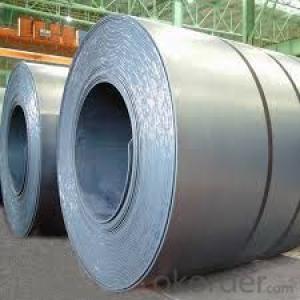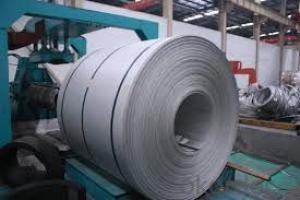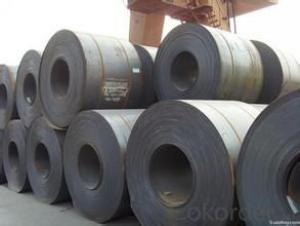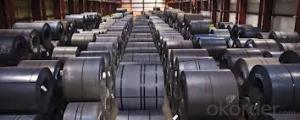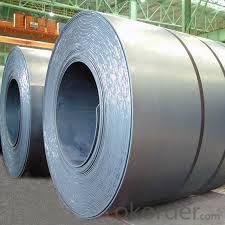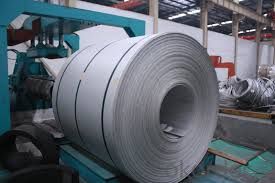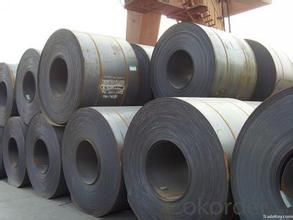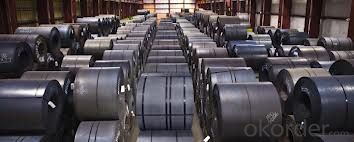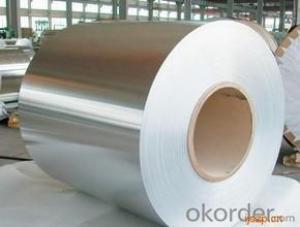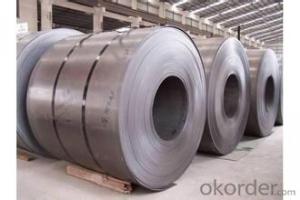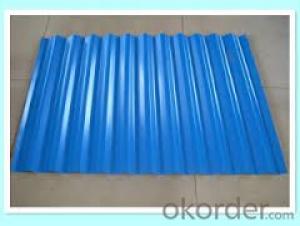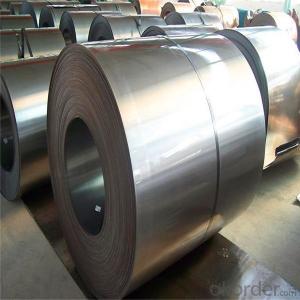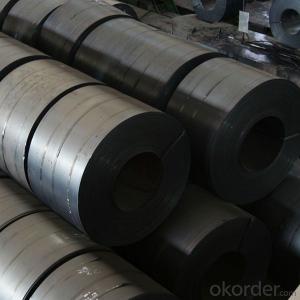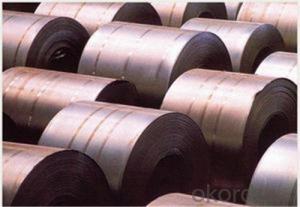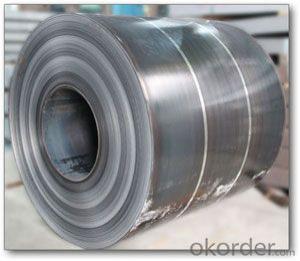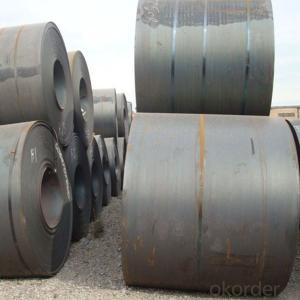Hot Rolled Steel Sheet in Coil CS TYPE A,B,C from China
- Loading Port:
- Tianjin
- Payment Terms:
- TT OR LC
- Min Order Qty:
- 100 m.t.
- Supply Capability:
- 500000 m.t./month
OKorder Service Pledge
OKorder Financial Service
You Might Also Like
Product Description:
Product: | Hot Rolled Steel Coils/Sheets |
Material: | Q195,Q235,A36,SS400,S235JR,Q345,ST37-2, CCSB etc |
Standard : | JIS G3002 GB/T251B |
Technique: | hot rolled |
Thickness | 1.2mm to 200mm |
Tolerance of thickness: | :+/-0.03mm |
Width: | 750mm-2000mm |
Tolerance of width: | :+/-5.00mm (aiming to +/-2.00mm) |
Normal width: | 914mm, 1000mm, 1200mm, 1219mm, 1250mm,1500mm |
Length: | According to requirement |
Coil ID: | 508mm-610mm |
Coil Weight: | 10-25 Metric Tons |
Surface: | Black, Chromate, fingerprint resistant treatment, slight oiled or non-oiled, dry |
Port of Loading: | Tianjin/Shanghai port |
Packaging Details: | Standard export packing or according to the clients required |
Delivery Time | Within 30 days after received 30% deposit or workable L/C |
Payment Terms: | L/C,T/T |
We can ensure that stable quality standards are maintained, strictly meeting both market requirements and customers’ expectations. Our products enjoy an excellent reputation and have been exported to Europe, South-America, the Middle-East, Southeast-Asia, Africa and Russia etc.. We sincerely hope to establish good and long-term business relationship with your esteemed company.
Images of hold rolled steel coil:
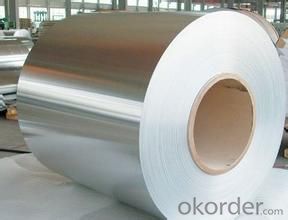
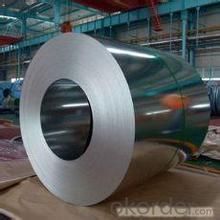
- Q: How are steel coils used in the production of agricultural systems?
- Steel coils are often used in the production of agricultural systems due to their durability and strength. These coils are typically used in the construction of machinery and equipment that are essential in agricultural operations. One common application of steel coils is in the manufacturing of farming machinery such as tractors, plows, and cultivators. These machines require sturdy components to withstand the demanding conditions of the agricultural environment. Steel coils are used to fabricate the frames, chassis, and other structural parts of these machines, providing the necessary strength and support. Steel coils are also used in the production of irrigation systems, which are crucial for efficient water management in agriculture. These coils are utilized in the construction of pipes, valves, and fittings, ensuring the durability and longevity of the irrigation system. Additionally, steel coils are used to manufacture storage tanks and silos, which are essential for storing and preserving agricultural products such as grains, seeds, and fertilizers. Furthermore, steel coils find application in the construction of greenhouses and agricultural buildings. The coils are used to fabricate the structural framework, providing stability and resistance against environmental factors. Steel coils are also used in the production of fencing and enclosures to protect crops and livestock from external threats. In summary, steel coils play a vital role in the production of agricultural systems by providing the necessary strength, durability, and stability required for farming machinery, irrigation systems, storage facilities, and agricultural structures. Their usage ensures that these systems can withstand the demanding conditions of the agricultural industry and contribute to efficient and sustainable farming practices.
- Q: Can you reload spent casings if they are steel?
- Technically they are reloadable but it's way too much effort and it'll probably cost more to do than its worth. I know you're probably asking this for surp. 7.62x54r right? The steel will have to be fully resized every time and you should only do it 1-2 time max to be safe. Also if your ammo is berdan primed the primers are very hard to find and these are a whole different beast than boxer primed. Short answer is yes but not worth it IMO.
- Q: What are the common applications of hot-dip galvanized steel coils?
- Hot-dip galvanized steel coils are widely utilized across various industries due to their exceptional resistance to corrosion and long-lasting durability. These coils find numerous applications in different sectors, including construction, automotive, appliances, agriculture, electrical and telecommunication, transportation, and industrial sectors. The following are some of the common uses of hot-dip galvanized steel coils: 1. Construction: The construction industry extensively relies on hot-dip galvanized steel coils for applications like roofing, siding, gutters, and downspouts. The coils' corrosion resistance ensures that structures can withstand harsh weather conditions, resulting in low-maintenance and long-lasting buildings. 2. Automotive: In the automotive sector, hot-dip galvanized steel coils are widely employed for manufacturing body panels, frames, chassis, and structural components. These coils provide enhanced protection against rust and offer high strength, ensuring the longevity of automotive parts. 3. Appliances: Hot-dip galvanized steel coils are utilized in the production of various household appliances such as refrigerators, air conditioners, ovens, and washing machines. The coils' corrosion resistance and aesthetic appeal make them an ideal choice for these appliances. 4. Agriculture: The agricultural sector commonly uses hot-dip galvanized steel coils for constructing greenhouses, livestock shelters, fences, and irrigation systems. The galvanized coating protects the steel from corrosion caused by exposure to moisture and chemicals commonly found in agricultural settings. 5. Electrical and Telecommunication: The electrical and telecommunication industries employ hot-dip galvanized steel coils for manufacturing transmission towers, poles, cable trays, and electrical conduits. These coils' corrosion resistance and high strength ensure the safety and reliability of these infrastructure components. 6. Transportation: Hot-dip galvanized steel coils play a significant role in the transportation industry, particularly in manufacturing trailers, shipping containers, and chassis components. The galvanized coating provides protection against corrosion caused by road salt, moisture, and various environmental factors. 7. Industrial Applications: Hot-dip galvanized steel coils are widely used in various industrial applications, including storage tanks, pipelines, ductwork, and industrial equipment. The coils' corrosion resistance and durability ensure the integrity and longevity of these structures and equipment. In conclusion, hot-dip galvanized steel coils have a wide range of applications in industries such as construction, automotive, appliances, agriculture, electrical and telecommunication, transportation, and industrial sectors. The coils' corrosion resistance, durability, and aesthetic appeal make them a versatile and extensively used material in these applications.
- Q: Why is iron used to create steel? Why not other elements?
- iron came before steel. iron is what was discovered that, under certain circumstances, became a stronger metal: steel. that is why. its like asking why copper is in bronze. because what we call bronze, is an alloy of copper and tin. if you give a more detailed question, i may be able to give a more detailed answer.
- Q: How do steel coils contribute to the construction industry?
- Steel coils are essential in the construction industry as they are used to manufacture a wide range of structural components and materials. These coils are transformed into beams, pipes, sheets, and other forms, providing the necessary strength and durability required for construction projects. Steel coils also offer versatility, allowing for customization and adaptation to meet specific project requirements. Their contribution to the construction industry is undeniable, as steel coils form the backbone of many structures, ensuring stability, safety, and longevity.
- Q: How are steel coils processed for painting or coating?
- Steel coils are typically processed for painting or coating through a series of steps. First, the coils are cleaned to remove any dirt, oil, or rust. This is usually done through a chemical cleaning process or by using mechanical methods such as shot blasting. Next, the coils are pre-treated to enhance adhesion and corrosion resistance. This can involve applying a conversion coating or a primer. Finally, the coils are painted or coated using a variety of methods such as roll coating, spray coating, or electrostatic coating. The specific process depends on the desired finish and application requirements.
- Q: im buying a sword and i dont know if i should buy a cold steel sword or a normal sword and that i can some how make that cold steel
- Cold Steel takes a billet (read piece of metal stock) in high carbon steel, usually 1060 which is pretty good, and then heats it up and pounds it into shape with a pre-made form. This is called forging. Their swords are not Folded (the traditional manner) they are Forged. This is different from taking a piece of 1060 steel and just grinding it down into shape. The forging process creates very strong steel (not as strong as folding) that is much stronger than a sword or knife made from grinding a piece of metal down into shape. Cold Steel's stuff is generally thicker, but they are practical and with enough practice you can wield it just like a thinner lighter sword. Their weapons are what you would call battle ready meaning you could feasibly take it into a sword fight and use it like its more traditionally crafted counter part. The only downfall is its weight and and the fact that it isn't as strong as a folded steel sword, but it would do very well.
- Q: How do steel coils contribute to energy efficiency in appliances?
- Steel coils contribute to energy efficiency in appliances in several ways. Firstly, steel coils are commonly used in the heat exchangers of appliances such as refrigerators, air conditioners, and water heaters. These coils transfer heat efficiently, allowing appliances to cool or heat the desired space using less energy. By maximizing heat transfer, steel coils help appliances reach the desired temperature faster and maintain it with minimal energy consumption. Secondly, steel coils are often used in the heating elements of appliances like stoves and ovens. These coils provide direct heat to cook or bake food. Steel's excellent thermal conductivity ensures that the heat is evenly distributed, reducing cooking time and energy consumption. This allows appliances to work more efficiently, saving both time and energy. Furthermore, steel coils are durable and long-lasting, which contributes to energy efficiency in appliances. Appliances with steel coils are built to withstand high temperatures and frequent use. This means they require less maintenance and replacement, resulting in fewer resources being used to produce new appliances. By reducing waste and conserving resources, steel coils indirectly contribute to energy efficiency and sustainability. Lastly, steel is a recyclable material. When appliances reach the end of their life cycle, the steel coils can be recycled and used to produce new products. Recycling steel reduces the need for extracting raw materials and saves energy that would otherwise be required in the manufacturing process. This promotes energy efficiency and reduces the environmental impact of appliances. In conclusion, steel coils contribute to energy efficiency in appliances by optimizing heat transfer, reducing cooking time, promoting durability, and facilitating recycling. These factors collectively help appliances operate more efficiently, save energy, and contribute to a more sustainable future.
- Q: What are the different thickness tolerances for steel coils?
- The specific requirements and industry standards can cause the thickness tolerances for steel coils to vary. There are several common thickness tolerances for steel coils: - The standard tolerance ranges from ±0.005 inches to ±0.010 inches. This means that the actual thickness of the steel coil can deviate within this range from the specified thickness. - Stricter tolerances, known as tighter tolerances, may be necessary in certain cases, particularly for critical applications or industries. These tighter tolerances can range from ±0.002 inches to ±0.005 inches, ensuring more precise thickness control for the steel coils. - Custom thickness tolerances can be defined to meet the specific needs of a project or customer. These custom tolerances can be looser or tighter than the standard or tighter tolerances, depending on the application and desired precision level. It is important to consider that different industries and applications may have their own unique tolerance requirements. For example, industries such as automotive or aerospace may demand tighter tolerances due to the critical nature of their applications, while other industries may accept looser tolerances. Additionally, the specific type of steel being used can also affect the acceptable thickness tolerances. Therefore, consulting the relevant industry standards and specifications is crucial in determining the appropriate thickness tolerances for steel coils in a particular application.
- Q: How do steel coils contribute to the aerospace industry?
- Steel coils contribute to the aerospace industry by being used in the manufacturing of various aircraft components such as engine parts, landing gear, and structural elements. The high strength and durability of steel make it a preferred material for these applications, ensuring the safety and reliability of aircraft. Additionally, steel coils are also used in the production of specialized tools and equipment required for aerospace manufacturing processes.
Send your message to us
Hot Rolled Steel Sheet in Coil CS TYPE A,B,C from China
- Loading Port:
- Tianjin
- Payment Terms:
- TT OR LC
- Min Order Qty:
- 100 m.t.
- Supply Capability:
- 500000 m.t./month
OKorder Service Pledge
OKorder Financial Service
Similar products
Hot products
Hot Searches
Related keywords
